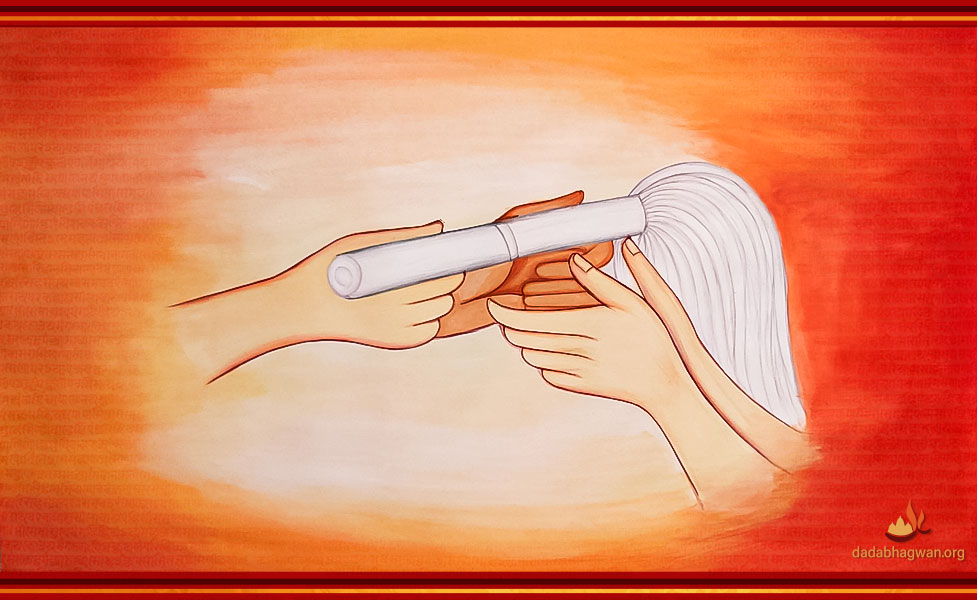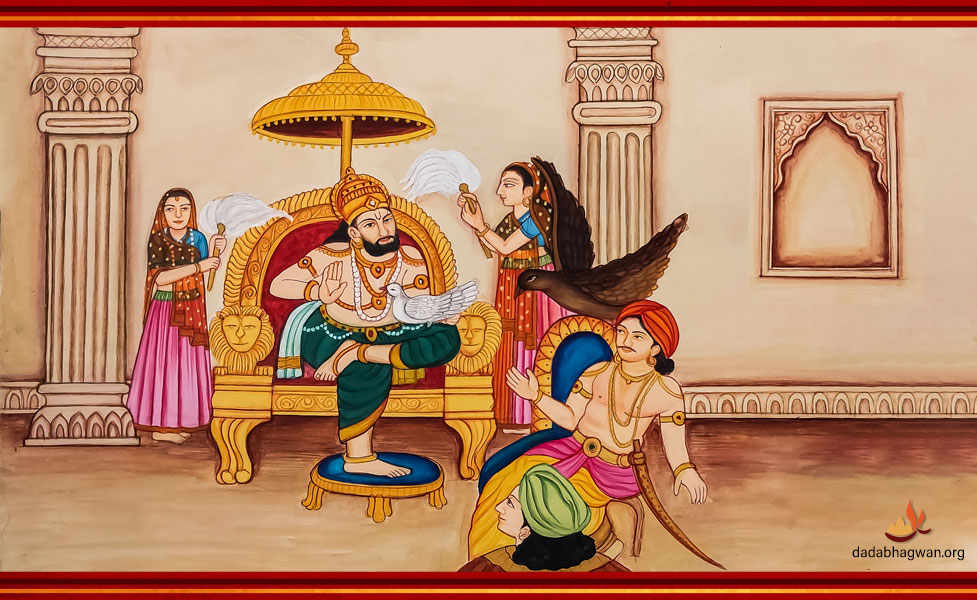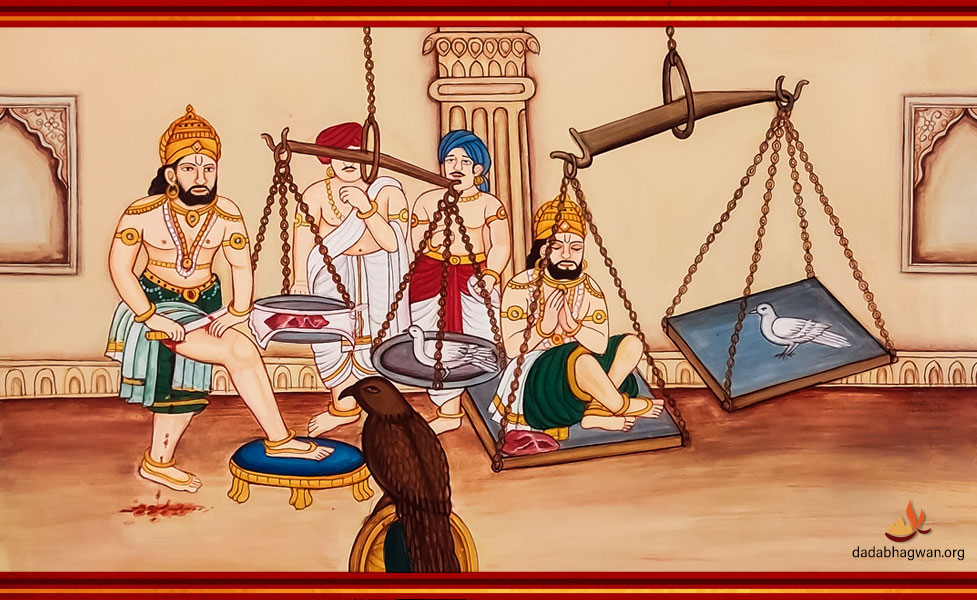Shree Shantinath Bhagwan: Past Lives of the Sixteenth Tirthankara
We will now read about the last eleven births of Lord Shantinath Bhagwan before He became a Tirthankara. Among these, the incident of compassion in His tenth birth as King Meghrath holds a historic place in the spiritual world. So let us explore the journey of liberation of Lord Shantinath Bhagwan through these eleven births, each one a step in passing karmic tests and ultimately binding the firm resolution to become a Tirthankara.
First Birth – King Shrishen, Second Birth – Yuglik and Third Birth – Heaven
Shree Shantinath Bhagwan's first birth (of the 11 previous births prior to becoming a Tirthankar) was as King Shrishen. He had two queens, Abhinandita and Shikhinandita. He also had two sons; they were quite valorous.
When the two sons grew young, King Shrishen arranged the marriage of both his sons with princesses. When the princesses arrived in his kingdom for the wedding, they were accompanied by a dancer who was extremely beautiful. Seeing the dancer, both the princes fell in love with her. Finally, leaving aside marrying the princess, both the brothers started fighting with each other for the dancer and a war broke out between them.
Even after much persuasion by King Shrishen, his two sons had become so blind in love that they did not understand. Seeing all this, King Shrishen was very sad. Finally, finding no other way, King Shrishen committed suicide. Seeing this, his queens, Abhinandita and Shikhinandita, also consumed poison and committed suicide. On the other hand, Satyabhama, the foster sister of King Shrishen, also committed suicide.
When suicide is committed, very rarely does a person get a good next life. However, King Shrishen, his wives and sister Satyabhama had lived a devoted and pious life. As a result, despite committing suicide, their next birth did not get spoilt.
The next birth of King Shrishen and Queen Abhinandita was as a Yuglik. After completing his lifespan, his third birth was in heaven, and there for a long time, he enjoyed the heavenly pleasures.
Fourth Birth – Vidyadhar Amittej and Fifth Birth – Heaven
Upon spending a long time in the celestial life-form, the fourth birth of Lord Shantinath happened as Vidyadhar Amittej. His sister’s name was Sutara (who was Satyabhama in the previous birth). Sutara was married to a prince named Shrivijay (who was Queen Abhinandita in the previous birth). Shrivijay was the son of Tripushta Vasudev (one of the previous incarnations of Lord Mahavir). This is how the two Tirthankars of the current time cycle got together in their previous incarnations.
Prince Shrivijay’s sister, Jyotiprabha (who was Queen Shikhinandita in her previous birth), was the wife of King Amittej (King Shrishen in the previous birth). Vidyadhar Ashnighosh (Satyabhama’s husband in the previous birth) kidnapped Vidyadhar Amittej's sister, Sutara. After the abduction of Sutara, a fierce battle took place between Ashnighosh and Shrivijay. In the war, being a Vidyadhar, Ashnighosh was fighting the battle using many tricks and deceptions. In such a situation, Vidyadhar Amittej came in. With his skilful knowledge, he almost killed Ashnighosh and became victorious. Escaping from the war, Vidyadhar Ashnighosh took the shelter of a Muni Maharaj and took Diksha. On the other hand, Vidyadhar Amittej also came to Muni Maharaj and embraced Shravak Dharma; he heartily repented and atoned (did Pratikraman) for his sins and began to rule his kingdom peacefully.
Then, one day, King Amittej went to Muni Maharaj and asked, "Now, how many years of life are left for me to live?" Then, Muni Maharaj said, "Now, only 26 days of life are left." On hearing this, King Amittej felt extreme dispassion and all his moha (illusory attachment) shed off. Realizing that his death was near, King Amittej took Diksha from the Muni and spent his time in great worship and devotion.

Seeing this, Shrivijay also felt like taking Diksha and doing devotional worship. King Shrivijay bound an extremely strong karma (niyanu) of attaining tremendous power, splendour and strength like that of his father Vasudev Tripushta and did tremendous penance. According to the niyanu, Shrivijay, in his next birth, attained the status of Vasudev.
Finally, Shrivijay and Amittej died and they were born in heaven, which was Lord Shantinath’s fifth reincarnation.
Sixth Birth – Baldev Aparajit and Seventh Birth – Heaven
In the sixth birth, the Soul of King Shrishen took birth as Aparajit Baldev and that of Queen Abhinandita took birth as a Vasudev named Anantvirya. For 12 births, the Souls of King Shrishen and Queen Abhinandita came together in different forms of relationships. Baldev Aparajit and Vasudev Anantvirya had great affection for each other.
When both Baldev Aparajita and Vasudev Anantvirya attained youth, one day, it so happened that they got quite lost in watching a dancer’s dance. Just then, Naaradmuni came to their court but both the brothers being engrossed in watching the dance, no one gave Naaradji a good welcome. Thus, Naaradji felt insulted and developed a tremendous grudge towards the two brothers. To avenge the insult, Naaradji provoked Prativasudev Damitari. Finally, a big battle took place between Vasudev Anantvirya and Prativasudev Damitari. As per the rule (of Nature), Prativasudev dies at the hands of Vasudev only. By defeating Prativasudev Damitari, Vasudev Anantvirya attained the status of Ardha Chakravarti.
Upon doing great devotional worship, in the seventh birth, Baldev Aparajit was born in heaven.
Eighth Birth – Chakravarti Vajrayudh and Ninth Birth – Heaven
In the eighth birth, the Soul of Shantinath Bhagwan descended from the heaven and took birth as Vajrayudh Chakravarti. He became Chakravarti, meaning the ruler of the whole Earth. The Soul of Queen Abhinandita, who was the wife of King Shrishen in the first birth, came in this birth as Sahastrayudh, the son of Chakravarti Vajrayudh.
Upon completion of life as Chakravarti Vajrayudh, Lord Shantinath’s ninth birth took place in heaven.
Tenth Birth – King Meghrath and Eleventh Birth – Heaven
After completing a long lifespan in heaven, in his tenth reincarnation, Lord Shantinath was born as King Meghrath. In King Meghrath’s life, an extremely beautiful event of compassion happened. His compassion was such that made the entire world adore him.

Once while King Meghrath was seated in his palace, suddenly a pigeon, gripped with fear, came flying from far as it was being followed by a big hawk. All of a sudden, that pigeon fell into King Meghrath’s lap. Immediately, as if talking in human language, in a fearful tone, the pigeon urged to King Meghrath, "Please protect me; this hawk wants to kill me." King Meghrath, by nature, was very compassionate; moreover, he was also a Kshatriya whose inherent virtue is to protect anyone who comes in his shelter, even if it means laying down one’s own life for the same.
King Meghrath gave Abhaydaan to the pigeon and also gave an assurance saying, "I shall save you at any cost." On the other hand, the hawk came to the scene and said to the King, "Why did you take away my prey? I am very hungry!" King Meghrath requested the hawk to eat something else and said that killing a living being binds karma that can take one right into hell. He also said, "This pigeon is very afraid of you. I will give you whatever you want to eat, but do not eat any living creature. This pigeon has come to my shelter."
The biggest non-violence lies in not eating any living being. One-sensed living being alone is allowed (to be eaten); other than that, from two-sensed onwards, no living being can be eaten because all these living beings are considered to be 'tras jeevas’. A tras jeev means the one, who seeing us, feels harassed and runs for life. King Meghrath tried hard explaining the hawk but it didn’t agree; rather, it insisted, "I consume only non-vegetarian food." Finally, King Meghrath proposed, "Okay, if you want to eat non-vegetarian food only, then I give you my flesh in exchange. Fill your stomach with it, but spare the pigeon." The hawk agreed to king’s suggestion!
The king called for a weighing balance. On one pan of it, he placed the pigeon, and on another, he started placing his own flesh, to measure the same weight, by cutting the various parts of his body. The king kept placing more and more of his flesh but the pan of the pigeon didn’t rise at all; so, the balance was not equalizing. Finally, King Meghrath himself sat in the pan. Seeing this, all his family members, his courtiers and ministers, and everyone in the kingdom were utterly shocked and they realized that this hawk bird should be some dubious being for sure. They pleaded before the king, "What are you doing? For this one dubious being, you are making us suffer. Your duty is to protect the kingdom. If you lay down your life for the sake of one pigeon, then who will take care of this kingdom?" However, the king remained steadfast in his decision. He sat in the pan and got ready to sacrifice his life so as to save the little pigeon’s life.

Just then, a celestial being came out and bowing before King Meghrath, he paid his obeisance. The celestial being expressed great reverence towards King Meghrath. Bowing before King Meghrath, he said, "Please forgive me. I have made a grave mistake. I am a celestial being. Owing to some revenge of the past life, when the hawk was behind the pigeon, ready to take his life, I entered into the body of both these birds in a dubious form and came to you. When in heaven, your compassion and kindness would be praised, I used to get jealous of you. The celestial beings would say that on this Earth, no one’s compassion towards living beings is as much as yours. So, I decided to test you. Therefore, I came here and because of me, you had to suffer. You have excelled in this examination of mine." Both the birds then flew away and the celestial being too asked for forgiveness and taking the king’s permission, left from there. In our scriptures, King Meghrath’s compassion towards living beings is an extraordinary example.
The Tirthankaras, Gnanis and Acharyas have greatly emphasized the importance of kindness towards living beings. No living being should be hurt by us and should not get killed too. Not only gross violence, but subtle violence, meaning hurting someone through our thoughts, also should not happen. One who wishes to go to Moksha, no living being in this world should be caused slightest hurt by thoughts, words or actions. That’s when he is said to have become deserving of Moksha (ultimate liberation)!
Param Pujya Dada Bhagwan also lived a life such that no living being is caused slightest hurt by him. He used to advise that every morning, we should pray to our inner God with a true heart, and say, May no living being be caused slightest hurt through my mind-speech-body." We should say this five times in a day, every day, with a true heart. Yet, if someone happens to get hurt by us, then through heart-felt repentance-pratikraman, it is possible to be free from that fault. Doing so, karma for future life does not get bound. "If someone kills me, how would I feel; so, if I kill somebody, how would the other person feel?"; thinking on those lines is called humanity.
Thereafter, King Meghrath took Diksha. Practicing great penance and kindness of a very high order, his eleventh birth happened in heaven.
Finally, after taking Diksha and performing intense austerities, King Meghrath bound the Tirthankara naam gotra. Due to His supreme compassion towards all living beings, his eleventh birth was in the heaven. Descending from there, let us now read the glorious life story of Lord Shantinath Bhagwan, from His birth, Diksha to Nirvana.
subscribe your email for our latest news and events





